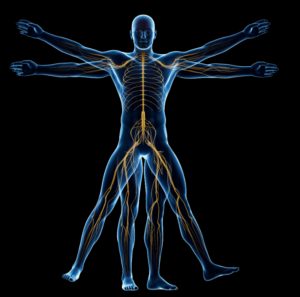Section 1: Sympathetic Nervous System

Anatomy and Physiology
The sympathetic nervous system (SNS) is an important component of the autonomic nervous system, responsible for orchestrating the body’s rapid response to stressors or perceived threats. It consists of a network of nerves that originate in the spinal cord’s thoracic and lumbar regions. Key components include pre-ganglionic neurons that synapse with post-ganglionic neurons, leading to the release of neurotransmitters. Notably, the neurotransmitters involved in the SNS response are adrenaline (epinephrine) and noradrenaline (norepinephrine), which act as chemical messengers that transmit signals between nerve cells.
Importance to Overall Health
The sympathetic nervous system plays a pivotal role in the “fight or flight” response, a fundamental survival mechanism. This response prepares the body to confront or escape potential threats, leading to increased heart rate, heightened alertness, and redirection of blood flow to vital organs. The SNS influences various physiological processes, including respiratory rate, dilation of the pupils, and mobilization of energy reserves. A chronic or exaggerated sympathetic response can contribute to imbalances in the body’s homeostasis.
Dysfunction
Potential dysfunctions associated with prolonged sympathetic dominance extend beyond immediate stress responses. Chronic stress and anxiety can lead to adverse health outcomes, including cardiovascular issues, immune system suppression, and disruptions in sleep patterns. Additionally, persistent sympathetic activation may contribute to conditions such as hypertension, digestive disorders, and heightened susceptibility to inflammation. Recognizing and addressing these dysfunctions are essential for mitigating the long-term health consequences of sustained sympathetic activity.
Nutritional Component
The nutritional biochemistry of the sympathetic nervous system (SNS) involves a complex interplay of biochemical pathways that regulate neurotransmitter synthesis, release, and receptor interactions. Key neurotransmitters associated with the SNS include adrenaline (epinephrine) and noradrenaline (norepinephrine). Understanding the biochemical pathways behind their production provides insights into how nutrition influences SNS activity.
- Tyrosine Conversion: Tyrosine, an amino acid obtained from dietary protein, serves as the precursor for adrenaline and noradrenaline. The conversion of tyrosine to L-dopa and subsequently to dopamine occurs in a series of enzymatic reactions.
- Dopamine to Noradrenaline Conversion: Dopamine is further converted to noradrenaline through the action of dopamine beta-hydroxylase. This conversion takes place within nerve terminals, particularly in the synaptic vesicles.
- Noradrenaline to Adrenaline Conversion: Noradrenaline is transported into the adrenal medulla, where it undergoes conversion to adrenaline. This process is catalyzed by the enzyme phenylethanolamine N-methyltransferase (PNMT).
- Release and Receptor Interaction: Upon stimulation, nerve impulses trigger the release of noradrenaline from nerve endings and adrenaline from the adrenal medulla. These neurotransmitters then bind to adrenergic receptors, particularly alpha and beta receptors, located on various target tissues, such as the heart, blood vessels, and respiratory system.
Science Behind Nutritional Influence
Nutrients play a pivotal role in these biochemical pathways, influencing the synthesis and availability of neurotransmitters. For instance:
- Tyrosine Rich Foods: Foods rich in tyrosine, such as dairy, eggs, and certain nuts, provide the essential building blocks for neurotransmitter synthesis.
- Cofactors for Enzymatic Reactions: Certain vitamins and minerals, such as vitamin C and copper, act as cofactors for enzymes involved in the conversion of tyrosine to neurotransmitters.
- Omega-3 Fatty Acids: These essential fatty acids, found in fish oil, have anti-inflammatory properties that may indirectly influence sympathetic activity.
Supplements
Explore the potential benefits of glandular supplements tailored to your individual health profile by setting up a free 10 minute call with Dr. Kneessi. Otherwise here are some of the most common supplement recommendations for supporting the sympathetic nervous system.
- Magnesium: Supports relaxation and helps counteract the effects of sympathetic overstimulation.
- B-vitamins (especially B5 and B6): Contribute to the synthesis of neurotransmitters involved in stress modulation.
- L-Theanine: Found in green tea, it promotes a calming effect without sedation and may attenuate stress responses.
- Rhodiola Rosea: An adaptogenic herb with potential stress-reducing properties.
- Omega-3 Fatty Acids: Known for their anti-inflammatory effects, supporting cardiovascular health and potentially influencing stress response.
These recommended supplements aim to foster a balanced sympathetic nervous system, promoting resilience and mitigating the negative impact of chronic stress. Consultation with a healthcare professional is advised before integrating new supplements into your wellness routine.




